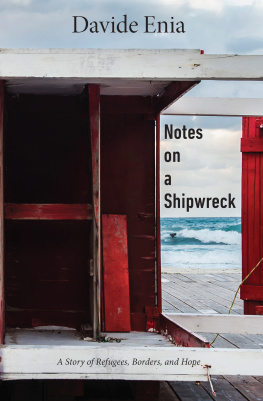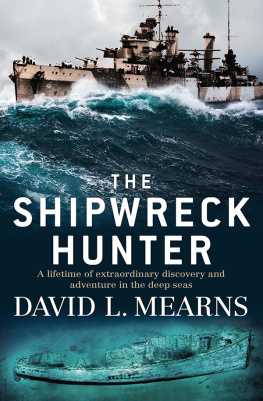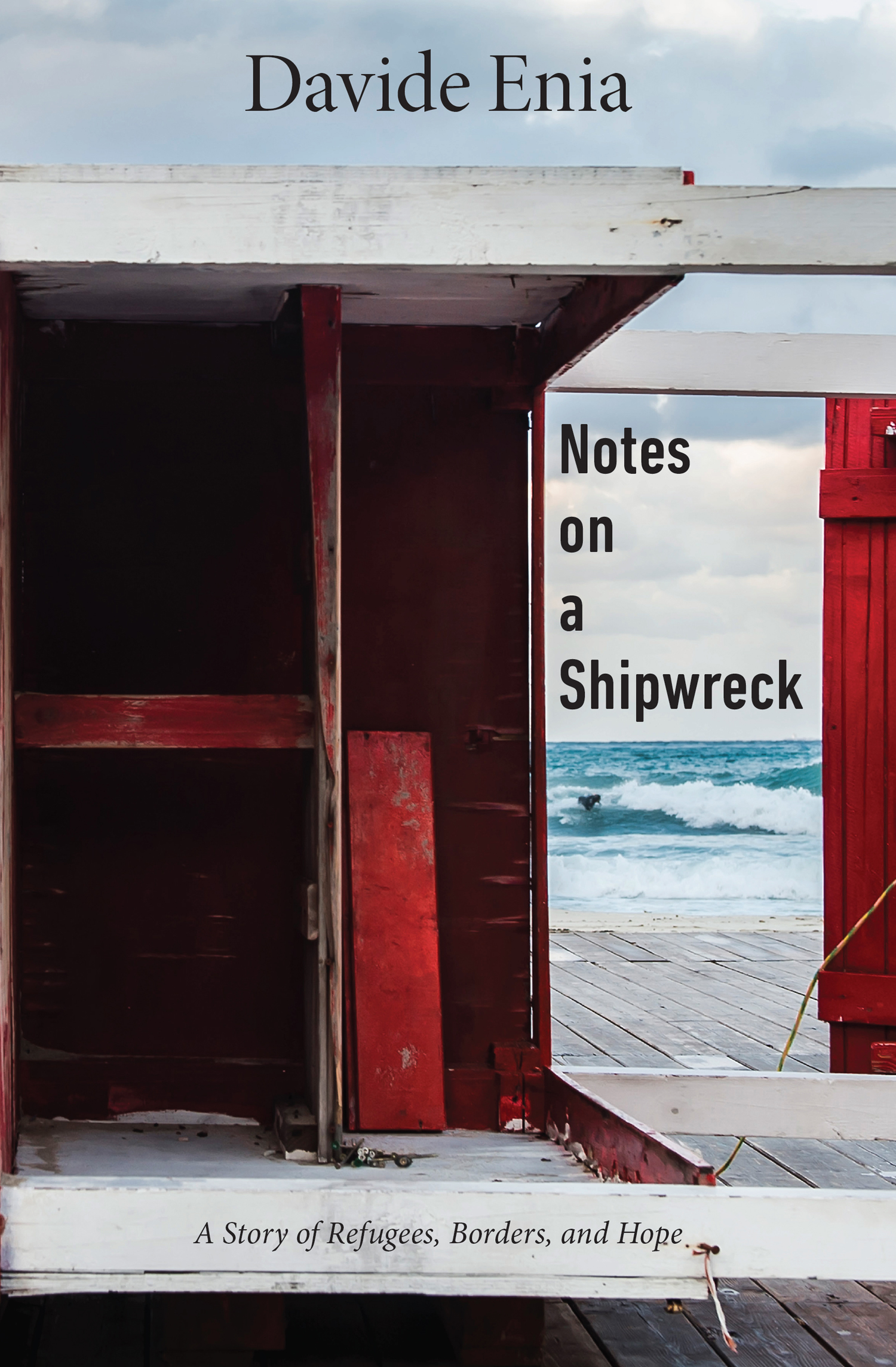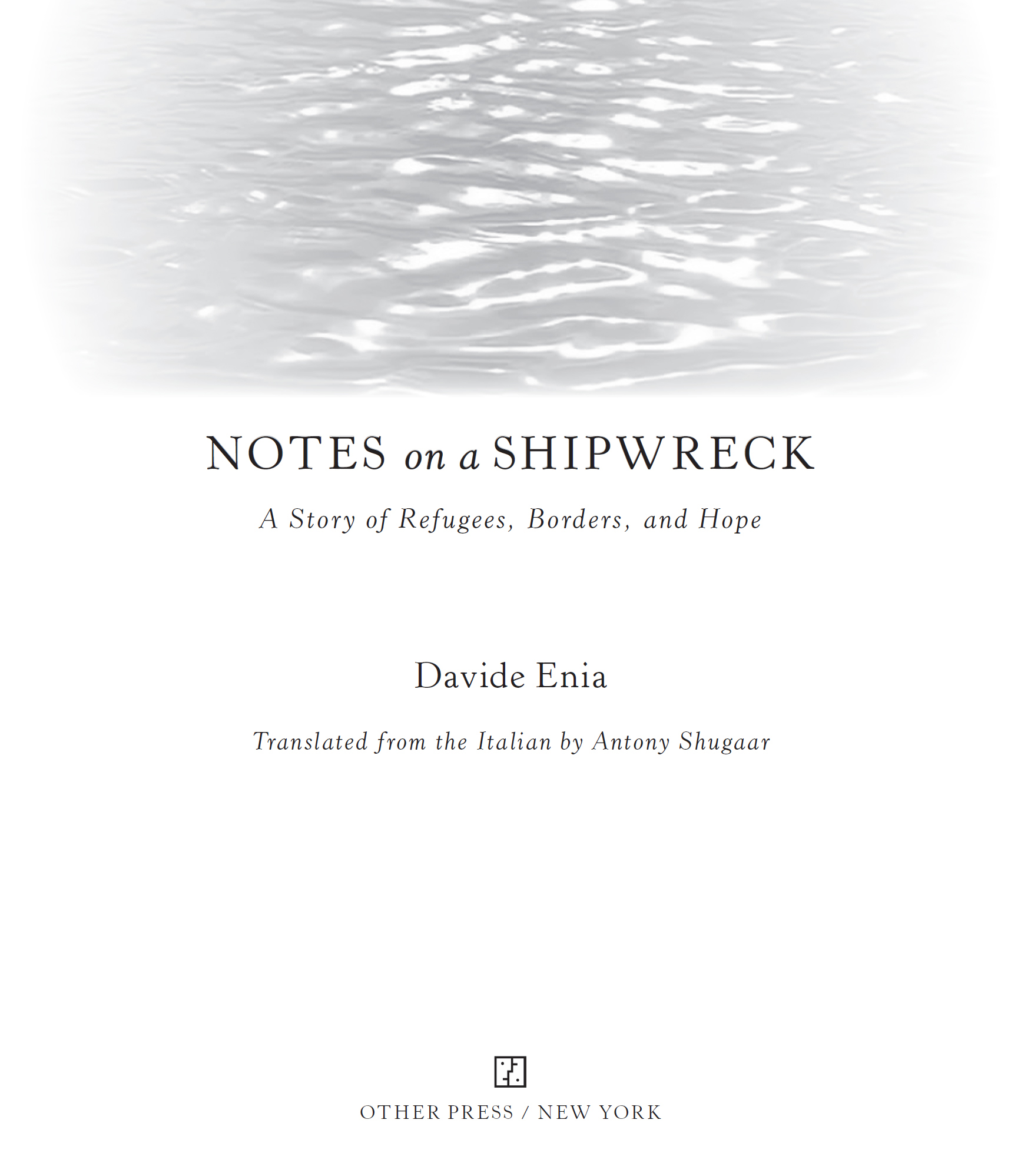Contents
Landmarks
Print Page List
ALSO BY DAVIDE ENIA
On Earth as It Is in Heaven
Copyright 2017 Sellerio editore, via Enzo ed Elvira Sellerio 50 Palermo
Originally published in Italian as Appunti per un naufragio in 2017
by Sellerio Editore, Palermo, Italy.
English translation copyright 2019 Antony Shugaar
Production editor: Yvonne E. Crdenas
Text designer: Jennifer Daddio
This book was set in Horley Old Style
by Alpha Design & Composition of Pitts field, NH
All rights reserved. No part of this publication may be reproduced or transmitted in any form or by any means, electronic or mechanical, including photocopying, recording, or by any information storage and retrieval system, without written permission from Other Press LLC, except in the case of brief quotations in reviews for inclusion in a magazine, newspaper, or broadcast. For information write to Other Press LLC, 267 Fifth Avenue, 6th Floor, New York, NY 10016.
Or visit our Web site: www.otherpress.com
The Library of Congress has cataloged the printed edition as follows:
Names: Enia, Davide, 1974 author. | Shugaar, Antony, translator.
Title: Notes on a shipwreck : a story of refugees, borders, and hope / Davide Enia ; translated from the Italian by Antony Shugaar.
Other titles: Appunti per un naufragio. English
Description: New York : Other Press, 2019. | Originally published in Italian as Appunti per un naufragio in 2017 by Sellerio editore via Enzo ed Elvira Sellerio 50 Palermo.
Identifiers: LCCN 2018029577 (print) | LCCN 2018044304 (ebook) | ISBN 9781590519103 (ebook) | ISBN 9781590519080 (paperback)
Subjects: LCSH: Enia, Davide, 1974TravelItalyLampedusa Island. | Enia, Davide, 1974Family. | Authors, Italian21st centuryBiography. | Lampedusa Island (ItalyEmigration and immigrationHistory21st century. | ShipwrecksMediterranean SeaHistory21st century. | BISAC: BIOGRAPHY & AUTOBIOGRAPHY / Personal Memoirs. | SOCIAL SCIENCE / Emigration & Immigration. | HISTORY / Modern / 21st Century.
Classification: LCC PQ4905.N53 (ebook) | LCC PQ4905.N53 Z46 2019 (print) | DDC 853/.92dc23
LC record available at https://lccn.loc.gov/2018029577
Ebook ISBN9781590519103
v5.4
a
Contents
FOR SILVIA,
my landing place
On Lampedusa, a fisherman once asked me: You know what fish has come back? Sea bass.
Then hed lit a cigarette and smoked the whole thing down to the butt in silence.
And you know why sea bass have come back to this stretch of sea? You know what they eat? Thats right.
And hed stubbed out his cigarette and turned to go.
There was nothing more, truly, to be said.
What had stuck with me about Lampedusa were the calluses on the hands of the fishermen; the stories they told of constantly finding dead bodies when they hauled in their nets (What do you mean, constantly? and theyd say, Do you know what constantly means? Constantly); scattered refugee boats rusting in the sunlight, perhaps nowadays the only honest form of testimony left to uscorrosion, grime, rustof whats happening in this period of history; the islanders doubts about the meaning of it all; the word landing, misused for years, because by now these were all genuine rescues, with the refugee boats escorted into port and the poor devils led off to the Temporary Settlement Center; and the Lampedusans who dressed them with their own clothing in a merciful response that sought neither spotlights nor publicity, but just because it was cold out and those were bodies in need of warmth.
H AZE BLURRED our line of sight.
The horizon shimmered.
I noticed for what must have been the thousandth time how astonished I was to see how Lampedusa could unsettle its guests, creating in them an overwhelming sense of estrangement. The sky so close that it almost seemed about to collapse on top of us. The ever-present voice of the wind. The light that hits you from all directions. And before your eyes, always, the sea, the eternal crown of joy and thorns that surrounds everything. Its an island on which the elements hammer at you with nothing able to stop them. There are no shelters. Youre pierced by the environment, riven by the light and the wind. No defense is possible.
It had been a long, long day.
I heard my fathers voice calling my name, while the sirocco tossed and tangled my thoughts.
I HAPPENED TO MEET the scuba diver at a friends house.
It was just the two of us.
The first, persistent sensation was this: He was huge.
His first words were these: No tape recorders.
He went over and sat down on the other side of the table from me and crossed his arms.
He kept them folded across his chest the whole time.
Im not talking about October third, he added, his mouth snapping shut after these words in a way that defied argument.
His tone of voice was consistently low and measured, in sharp contrast with that imposing bulk. Sometimes, in his phrases, uttered with the sounds of his homelandhe was born in the mountains of the deepest north of Italy, where the sea is, more than anything else, an abstractionthere also surfaced words from my dialect, Sicilian. The ten years hed spent in Sicily for work had left traces upon him. For an instant, the sounds of the south took possession of that gigantic body, dominating him. Then the moment would come to an end and hed run out of things to say and just stare at me, in all his majesty, like a mountain of the north.
Hed become a diver practically by sheer chance, a shot at a job that hed jumped at immediately after completing his military service.
We divers are used to dealing with death, from day one they told us it would be something wed encounter. They tell us over and over, starting on the first day of training: People die at sea. And its true. All it takes is a single mistake during a dive and you die. Miscalculate and you die. Just expect too much of yourself and you die. Underwater, death is your constant companion, always.
Hed been called to Lampedusa as a rescue swimmer, one of those men on the patrol boats who wear bright orange wetsuits and dive in during rescue operations.
He told me just how tough the scuba diving course had been, lingering on the mysterious beauty of being underwater, when the sea is so deep that sunlight cant filter down that far and everything is dark and silent. The whole time hed been on the island, hed been doing special training to make sure he could perform his new job at an outstanding level.
He said: Im not a leftist. If anything, the complete opposite.
His family, originally monarchists, had become Fascists. He, too, was in tune with those political ideas.
He added: What were doing here is saving lives. At sea, every life is sacred. If someone needs help, we rescue them. There are no colors, no ethnic groups, no religions. Thats the law of the sea.
Then, suddenly, he stared at me.
He was enormous even when he was sitting down.
When you rescue a child in the open sea and you hold him in your arms
And he started to cry, silently.
His arms were still folded across his chest.
I wondered what he could have seen, what hed lived through, just how much death this giant across the table had faced off with.
After more than a minute of silence, words resurfaced in the room. He said that these people should never have set out for Italy in the first place, and that in Italy the government was doing a bad job of taking them in, wastefully and with a demented approach to issues of management. Then he reiterated the concept one more time: At sea, you cant even think about an alternative, every life is sacred, and you have to help anyone who is in need, period. That phrase was more than a mantra. It was a full-fledged act of devotion.













